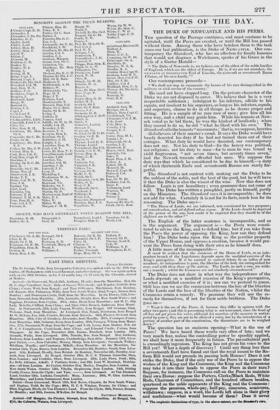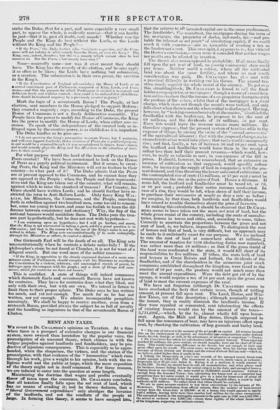TOPICS OF THE DAY.
THE DUKE OF NEWCASTLE AND HIS PEERS.
THE question of the Peerage continues, and must continue to be agitated, until the Peers are created, or until the Bill has passed without them Among those who hare betaken them to the task since our last publication, is the Duke of NEWCASTLE. Our con- temporary the Standard, who has an affection for family honours that would not disgrace a Weidman, speaks of his Grace in the style of a Garter Herald- " The Duke of Newcastle is, we believe, one of the oldest of the noble families of England, which are the oldest of Europe. He is, if we are not mistaken the TWELFTH GT THIRTEENTH Earl of Lincoln, the sixteenth or seventeenth Varon Clinton, of his own family."* Our contemporary proceeds- " We shall not stop to enumerate the heroes of his race distinguished in the military or civil service of the country."
He need not have stopped loner. On the private character of the Duke we are not disposed to enter. We believe that he is a very respectable nobleman ; indulgent to his inferiors, affable to his equals, not insolent to his superiors, so long as his inferiors, equals. and superiors, choose to do in all things as he deems proper and fitting. He is a sample of no rare race of men ; give him all his own way, and a child may guide him. While his tenants at New- ark voted as he bid them, he was the kindest of landlords ; When they ceased to do so, he did " what he liked with his own." The Standard calls the tenants " miscreants ;" that is, we suppose, heretics - -disbelievers of their master's creed. It says the Duke would have basely deserted his duty if he had not turned them out of their cottages. What duty he would have deserted, our contemporary does not say. Not his duty to God-for the heresy was political, not religious; not his duty to man-for to man he was bound to yield forgiveness, " not seven times, but seventy times seven," and the Newark tenants offended but once. We suppose the duty was that which he considered to be due to hirnself,-a duty of which thirteenth Earls and seventeenth Barons are rarely for- fretful.
The Standard is not content with making out the Duke to be the noblest of the noble, and the best of the good, but he will have it that the Duke is also the wisest of the wise. Now this does not follow. Logic is not hereditary ; even grammar does not come of will. The Duke has written a pamphlet, partly on himself, partly on the Ministers. The Standard says it is incomparable; he does not add for what. Certainly it is not for its facts, much less for its reasoning. The Duke says- " The House of Lords, we are informed, was constituted for two purposes; ad consulendum, and ad defendendum regent. If the Lords should be deprived of the power of the one, how could it be expected that they should be of the slightest use to the other ? "
The English of the latter sentence is incomparable, and so is the argument. The argument is - the Peers were consti- tuted to advise the King, and to defend him; but if you take from the Peers the power of opposingthe King, how can they defend him? The Duke looks upon the King as the peculiar property of the Upper House, and opposes a creation, because it would pre- vent the Peers from doing with their own as he himself does.
A little more of the incomparable- It must be evident, that the existence of the House of Lords, as an inde- pendent brancli of the Legislature, depends upon the modified exercise of the King's prerogative. If it be exerted to control debate by an influx of new members, its Independence is gone, the liberties of the body are extinguished for ever, and with them those of the nation. The Lords, in such a case, are with- out a remedy ; whilst the Commons ore not similarly circumstanced."
The Duke does not show in what way the independence of the Lords depends on a modified exercise of the King's prerogative, or what a modified exercise of it is; nor can we pretend to guess. Still less can we see the connexion between the loss of the liberties of the Lords and the loss of the liberties of the Nation, whilst the Commons retain a remedy. We presume they will use the re- medy for themselves, if not for their noble brethren. The Duke goes on- What is the use of the Peers, if, because they differ in opinion with the other two parts (and this is presuming what is not warranted, since the head of all has not yet given his voice, although his sanction of the measure.is antici- pated by some), they are not to be allowed a voice but by the introduction of a portion of another part of the constitution, the dissentients are to be weighed down ?"
The question has an ominous opening-What is the use of Peers? We have heard these words very often of late; and we very much fear, unless the controlling power be speedily applied, we shall hear it more frequently in future. The parenthetical part is exceedingly ingenious. The King has not given his voice to the Bill yet! What a depth of discovery ! Could any thing less than a seventeenth Earl have found out that the royal assent to the Re- form Bill would not precede its passing both Houses? Does it not strike the Duke, that if the only use of the Peers be to oppose the wishes of the King and the Commons, the King and the Commons may take it into their heads to oppose the Peers in their turn? Suppose, for instance, the Commons call on the Peers to maintain their own House: suppose the Porters, Clerks,!Black Rods, White Rods, Chairmen of Committees, and the hundred officers besides, quartered on the noble opponents of the King and the Commons: suppose the pensions, whole-pay, half-pay, sinecures, seinicures, withdrawn : suppose, in a word, the Lords left alone in their glory and usefulness-what would become of them? Does it- never
• The einphatictlistinctiona of type, in the above enact, seethe Standard's own. •
strike the Duke, that for a part, and more especially a very small part, to oppose the whole, is evidently unwise—that it can hardly be just—that it is, past all doubt, very unsafe? Whether can the People and the King do best without the Lords, or the Lords without the King and the People?— " If the Peers," the Duke further a,ks, "originate a que,tion, and the Com- mons will not indulge it, what remedy have the Peers, or even the King ? The - King, may, indeed, dissolve ; but this is a remedy which cannot often be had recourse to. But the Peers, what remedy have they ?"
None—assuredly none—nor was it ever meant they should have. The King has the remedy of dissolution, and he may apply it as often as he likes ; the Lords have nothing but submission, or a creation. 'The submission is in their own power, the creation in the King's.
" If the Constitution of England acknowledges the House of Lords as an (s>sential constituent part of Parliament, composed of King, Lords, and COW..
• more;,—and that the purpose hie which Parliament is created is to consult and deliberate freely and without controh—how could it be endured that all (elibera- . tious should be rendered nugatory by a previously created majority ? "
Mark the logic of a seventeenth Baron ! The People, at last election, sent members to the House pledged to support Reform ; they-created a majority; ergo, according to the Duke, the present House of Commons is not a freely deliberative assembly. The People have the power to modify the House of Commons, the King • has the power to modify the House of Lords, when either sees oc- casion. To speak of the independence of the created body as in- Sring,ed upon by the creative power, is as childish as it is impudent. The Duke kindles as he goes on- " (10 not question the King's prerogative to create Peers; but I maintain, and will ever support fearlessly, that a creation of Peers fin- a political purpose, is and would be a criminal breach ( it was so eonsidered in Queen Anne's time), and would actually place the Kitty and his Ministers in the situation of trai- tors to their country."
For what puipose would the head of the house of PELHAM have Peers created? We have been accustomed to look on the House of Peers as a purely political instrument. But it seems, by creat- . ing Peers, the King and the Ministers will act as traitors to their country—to what part of it? The Duke admits that the Peers . are at present opposed to the Commons, and. he- cannot deny they are opposed to the People : when the People and their representa- tives and the King are taken out of the country, what will remain, against which to raise the standard of treason? For Country, his Grace should have written Lords; and he should further have re- stricted the term to Anti-Reform Lords. Only fancy King WIL- LIAM, his Ministers, the Commons, and the People, marching • forth in rebellion against two hundred men, some too old to remem- ber, some .too young to know, and some too foolish to learn the dif- ference between consistency and obstinacy! Why, the flap of the national banners would annihilate them. The Duke puts the trea- son part hypothetically, but he does not rest with hypothesis— ".1 am reasoning upon an hypothesis; but I will go further, and assert, . that the King is not warranted in taking a part, whilst a great question is in discussion ; and that is the reason why the use of the King's name is not per- mitted in debate. The King acts unconstitutionally if he seeks unlawfully, through his Ministers or others, to control a debate."
Our thirteenth Earl will be the death of us all. The King acts unconstitutionally when he controls a debate unlawfully ! If the philosopher's stone be not found at Clumber, it is not for want of a diligent search. But one word more of the nobler reasoner— "If the King, in opposition to the already expressed decision of a main con- stituent estate of Parliament, should conspire with his Ministers to overthrow the Constitution by a violent, arbitrary, and unexampled stretch of power, he . infringes upon the compact with his people ; and a state of things will com- mence, which fOr centuries we have not known."
This is soothfast. A state of things will indeed commence which thirteenth Earls and seventeenth Barons have not known . for centuries. They have for centuries done what they liked, not only with their own, but with our own. We intend in future to limit them to their proper sphere. The Duke says he has written too much, and yet not enough. Too much for us he has not 'written, nor yet enough. We admire incomparable pamphlets amazingly. We shall be happy to receive another, even from a sixteenth Baron, provided always the subject be as full of novelty • and the handling as ingenious as that of the seventeenth Baron of Clinton.



























 Previous page
Previous page